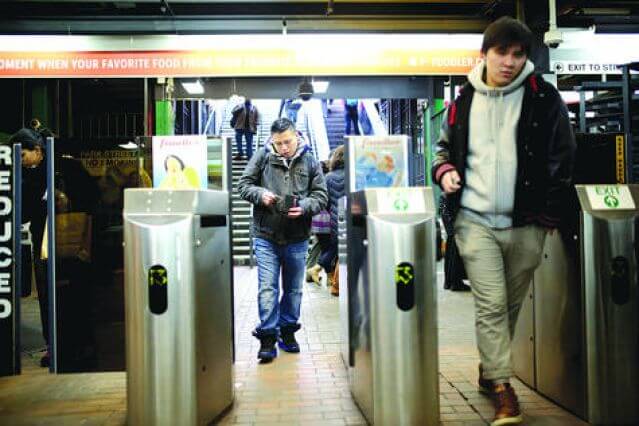Inveterate T scofflaws – those who skip fares, smoke, loiter and cause drunken scenes – are not just repeat offenders, but according the the MBTA transit police, often wanted for other, unrelated crimes. Transit Police initiated “point of entry” policing several years ago after former Superintendent-in-Chief Joe O’Connor attended a policing strategy conference in New York City.
The strategy – randomly placing uniformed and plain clothed transit officers near MBTA fare gates – has done well for the transit system, with officers frequently bagging offenders who have warrants out for their arrest. By flouting the T’s regulations and drawing attention to themselves, they make themselves easy targets, said MBTA Transit Police Lt. Richard Sullivan.
“You think people would learn,” Sullivan said. “They’re not catching on.”
Sullivan said he believes the department has prevented several serious crimes from taking place in the MBTA by nailing offenders at the turnstiles.
One recent example was Robert Glavin , 32, of Jamaica Plain. Transit Police said Glavin , who is wanted on numerous charges, skipped fare at Andrew Square station Wednesday evening by piggybacking behind a paying customer. When officers approached Glavin to write him a ticket, they discovered several warrants in existence issued out of South Boston District Court for possession to distribute a controlled substance, receiving stolen property, resisting arrest and carrying a dangerous weapon. The most common violations that result in arrests through point of entry policing, Sullivan said, is fare evasion, followed closely by smoking.
“It’s a great strategy. I’m a big proponent of it, as is our command staff,” said Sullivan. “We do it daily. Our jurisdiction is very unique. It’s very vast, but we also have entry points. To not take advantage of that would not utilize the full potential of our jurisdiction.”
MBTA gatekeepers: Transit Police say frequent offenders not taking heed at fare gates

NICOLAUS CZARNECKI/METRO


















